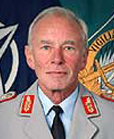Rome '08 Workshop
The Importance of Civil–Military Integration
General Rainer Schuwirth
Former SHAPE Chief of Staff

Civil-military integration, or cooperation or coordination, continues to be a topical issue, although one might think that, after decades of U.N. involvement, some 14 years for NATO, many years for the EU, five years for the ESDP, and many years for NGOs, along with libraries of papers on Civil-military cooperation that have been produced in the EU since 2001, the theory might be exhausted and now be common practice. But that has not happened, which means that it is not working, or at least not working well enough, despite the fact that everywhere I go I hear, read about, and of course have experienced such things as the comprehensive approach, networked security, a wider approach to security, and effect-based operations.
But when you look into lessons learned, you find deficiencies in areas such as the quality of situational awareness; the seamless dissemination and sharing of information by actors; the scope, speed, and quality of interdisciplinary planning and decision-making processes; effective linking of political and operational (civil-military) action in a crisis area; coordinated information management up the chain of command; and coordination among international organizations, local actors, and NGOs.
Thus, it may be that those who decide to take action and encounter a CMO are not sufficiently clear about what is expected of them, or ways to improve any given situation, the requirements for doing so, and the costs in terms of engagement, duration, personnel, capabilities, money, progress, and setbacks. It may be that sometimes the target that the IC sets for itself is overly ambitious.
It may also be that the IC—regardless of the organization—has not yet turned postulates into realistic approaches, approaches that are coordinated right from the beginning and that divide the overarching strategic aim into areas tailored to the specific qualifications of contributing parties, which also set targets for those who will be helped to avoid everlasting dependency on support from the outside.
Could it be, at least in some cases, that “history” will be rebuilt or reorganized instead of our opening a fresh, helpful way ahead? Could it be that organizations that have only limited capabilities in particular areas are setting their stakes too high? Why is it so difficult to bring international organizations together in a coordinated or comprehensive approach? This panel and the audience are invited to address these issues and hopefully to come up with some suggestions how to do better in the future.
